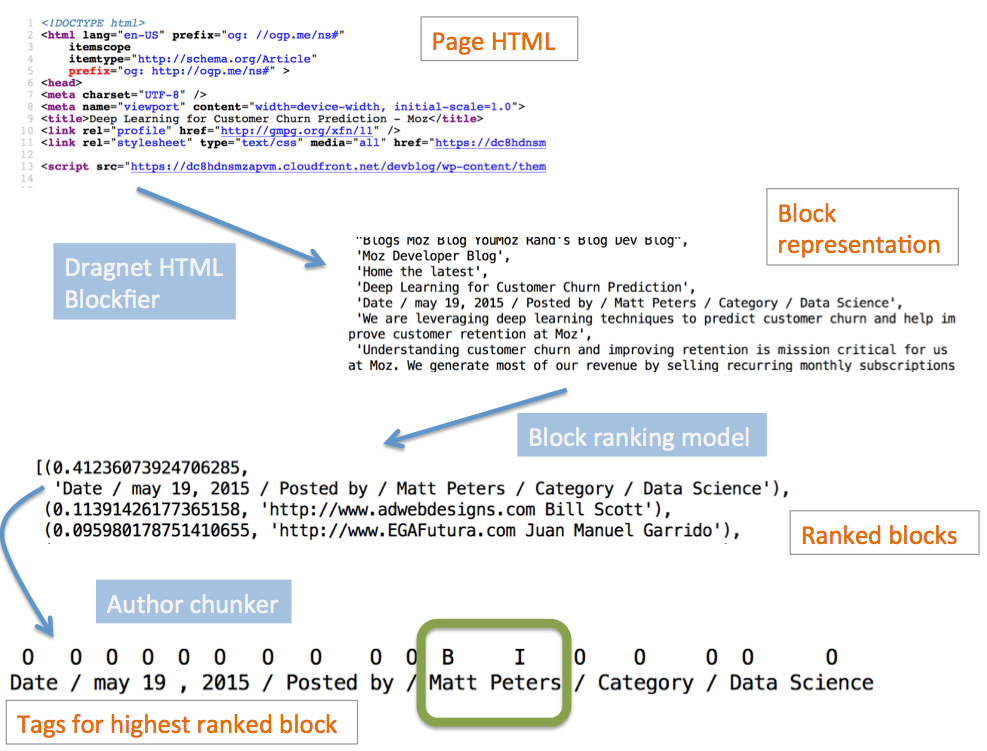Moz Developer Blog
Moz engineers writing about the work we do and the tech we care about.
Web page author extraction
Posted by Matt McDonnell on December 2, 2015
Extract a list of author names (or an empty list if no authors) from a given web page. Moz Content is a tool that analyzes news articles, blog posts and other content to help marketers audit and discover relevant content. To build out that audit feature, we needed a reliable author detection algorithm that could process a web page and return a list of authors. An author detection algorithm is essential to both analyze multiple author sites and track individual authors across multiple sites. This post illustrates our author detection algorithm and provides some benchmarks against Alchemy API and other implementations.
Difficulties of author extraction
When we first started discussing this project, we asked whether we needed to develop a machine learning algorithm or whether a rule-based system would be sufficient. Our product manager, Jay Leary, prototyped a rule-based system that was used in our alpha release. It used these heuristics, among others:- The microformat
rel="author"attribute in link tags (a) is commonly used to specify the page author. - Some sites specify page authors with a meta author tag.
- Many sites use names like "author" or "byline" for
classattributes in their CSS.
<div class="article-byline">
<div class="name vcard">
By <a href="/author/mike-lindblom/"
rel="author"
class="p-author h-card hcard url fn">Mike Lindblom</a>
...
</div>
</div>
However, there are many pages where these rules fail. Some do not include any special author markup. For example, this page does not include any markup in the byline:
 It also illustrates another challenge where the author is not a person's name but rather an organization. Other examples along these lines are phrases like "Editor" or "News Staff."
In other cases, the page markup is misleading. For example, this news page includes a byline without any markup and a link with
It also illustrates another challenge where the author is not a person's name but rather an organization. Other examples along these lines are phrases like "Editor" or "News Staff."
In other cases, the page markup is misleading. For example, this news page includes a byline without any markup and a link with rel="author" to "Admin" below the story:
 Pages with links to related content and many bylines also present a challenge to distinguish them from the main article byline:
Pages with links to related content and many bylines also present a challenge to distinguish them from the main article byline:
 Finally, some pages do not include any author, and our algorithm should gracefully handle these cases. Blog home pages and category pages are particularly tricky cases, since they often include many links and bylines on a single page but don't have a single author.
Finally, some pages do not include any author, and our algorithm should gracefully handle these cases. Blog home pages and category pages are particularly tricky cases, since they often include many links and bylines on a single page but don't have a single author.
Machine learning to the rescue!
Supervised machine learning provides a way to move beyond a rule-based system. We partnered with Spare5 to crowd source high quality labeled training data using their platform. Accurate labeled data was essential for training an excellent model, and Spare5 delivered. In our case, the training data includes the HTML with extracted author names.Model overview
While it may be possible to train an end-to-end deep learning algorithm on the raw data, we decided to start with a conventional system with prescribed architecture and hand engineered features. This allowed us to quickly develop and ship an algorithm for the product launch. The above figure illustrates the model using a previous post on our blog as a case study. At a high level, the model processes a page with three main steps (working from top to bottom of the figure):
The above figure illustrates the model using a previous post on our blog as a case study. At a high level, the model processes a page with three main steps (working from top to bottom of the figure):
- Parsing the HTML into a list of small pieces
- Determining which piece contains the author
- Extracting the author tokens from the selected piece
Block model
The block model is a random forest classifier trained to predict the probability the block includes the author. We used several different types of features, including:- Tokens in the block text
- Tokens in the block HTML tag attributes
- The HTML tags in the block
rel="author"and other markup inspired features
| K | Precision |
| 1 | 0.923 |
| 2 | 0.940 |
| 3 | 0.964 |
Author chunker
The author chunker is a modified version of an averaged perceptron tagger to include features unique to web pages. It takes the highest-ranked blocks as input and returns IOB (In-Out-Begin) labels for each token, effectively splitting the text into author and non-author chunks. To make a prediction, the chunker uses these features, among others:- Unigrams, bigrams and trigrams from the previous/next few tokens
- N-gram part-of-speech tags for the previous/next few tokens
- HTML tags preceding and following the token
- The previous predicted IOB tags
rel="author"and other markup inspired features
Overall performance and benchmarks vs other implementations
The following table shows end-to-end accuracy of the final model and a few other benchmark implementations (see the notes at the end for details on how we computed these results). It includes Jay's original prototype, the results from Alchemy API's Authors Extraction endpoint and the authors from Newspaper, a popular Python web scraping library. We'd like to extend this list with additional APIs and libraries in the future. If you would like to see the comparisons from others, please let us know in the comments.| Implementation | Overall accuracy |
| Final model | 80.5% |
| Jay's prototype | 61.1% |
| Alchemy API | 54.5% |
| Newspaper | 44.1% |
- The algorithm returns an author for a page without an author
- The algorithm returns the wrong author for a page with an author
- The algorithm returns no authors for a page with an author